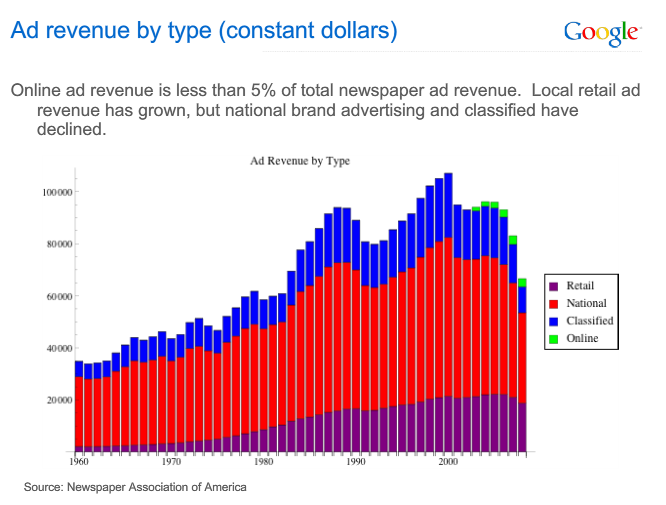
Earlier today, Google chief economist Hal Varian gave a presentation to an FTC workshop on the changing economics of the newspaper industry. We all know that newspaper ad revenues have been falling off a cliff for years. Many media companies blame Google and are trying to put the genie back in the bottle with partial metered models for online news.
Google is understandably on the defensive, trotting out Varian to paint an unemotional picture with as much data as he can muster. But the picture he paints is a dour one for print media. For instance, the chart above shows the decline of overall newspaper ad revenues. Newspapers have taken huge hits in classifieds advertising (in blue) and national brand advertising (in red). The online portion (green) is still too small to make much of a difference.
The collapse in print ad revenues is coming from two places: the overall ad recession of the past couple years and the shift to online news consumption. Here are some telling stats from Varian’s presentation, which is also embedded below:
- About 40% of internet users say read news on the Web every day.
- Time spent on online news sites is only about 70 seconds per day, compared to 25 minutes spent reading a print edition.
- Online news readers tend to read at work, not for leisure, so they don’t have much time to stick around and are thus worth less to advertisers.
- Overall, less than 5 percent of newspaper ad revenues come from the online editions.
- Search engines account for 35 to 40 percent of “traffic to major U.S. news sites,” according to comScore.
- The cost of printing and distributing print editions, makes up about half the cost, while editorial operations only make up 15 percent.
Varian concludes: “Newspapers could save a lot of money if the primary access to news was via the internet.” It sounds like he agrees with Netscape founder and investor Marc Andreessen, who recommends that newspapers “burn the boats” carrying their dying print businesses.
“The fact of the matter is that newspapers have never made much money from news,” says Varian. They make money from “special interest sections on topics such as Automotive, Travel, Home & Garden, Food & Drink,, and so on.” The problem is that on the Web, other niche sites which cater to those categories are a click away, leaving the newspapers with sections which are harder to sell ads against, such as sports, news, and local.
So what are they supposed to do? He doesn’t really have a good answer, but ignoring the realities of consumer shifts in reading behavior and news consumption is not it.